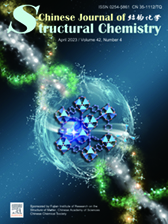
Cover Picture
Utilization of porous liquids for catalytic conversion
Yewei Ren, Guosheng Zhou, Ziyang Lu*
Submit a Manuscript
Utilization of porous liquids for catalytic conversion
Yewei Ren, Guosheng Zhou, Ziyang Lu*
Submit a Manuscript
Utilization of porous liquids for catalytic conversion
Yewei Ren, Guosheng Zhou, Ziyang Lu*
Chin. J. Struct. Chem., 2023, 42: 100045. DOI: 10.1016/j.cjsc.2023.100045
April 15, 2023
ABSTRACT
Overall, the variable regulation of sterically
hindered solvents of porous ionic liquids endows them with excellent catalytic
conversion performance, and also accelerates the further development of porous liquids
in the field of catalysis. However, although the research of porous liquids in
the field of catalysis has made phased progress, there are still several unmet
challenges: (1) The complex synthesis steps and high cost of porous liquids
limit their large-scale application in industrial catalysis. (2) As the
research on porous liquids is still in the initial stage, except for the good
catalytic performance of ionic liquids, the advantages of other sterically
hindered solvents in the field of catalysis have not been explored. (3) At
present, the prepared porous liquids have some problems, such as cavity
collapse, cavity plugging and poor interface compatibility between porous
solids and solvents, which lead to unsatisfactory stability of porous liquids.
Therefore, it is significant to find sterically hindered solvents which are easy
to synthesize, cheap, large size and helpful for catalytic conversion. In
addition, by introducing surface functionalized porous solids to enhance the
interaction between them and solvents, a stable system with high compatibility
can be obtained. Tackling the above challenges will be the definite goal of future
endeavors, and will contribute to the wider application of porous liquids in
the field of catalytic conversion.






